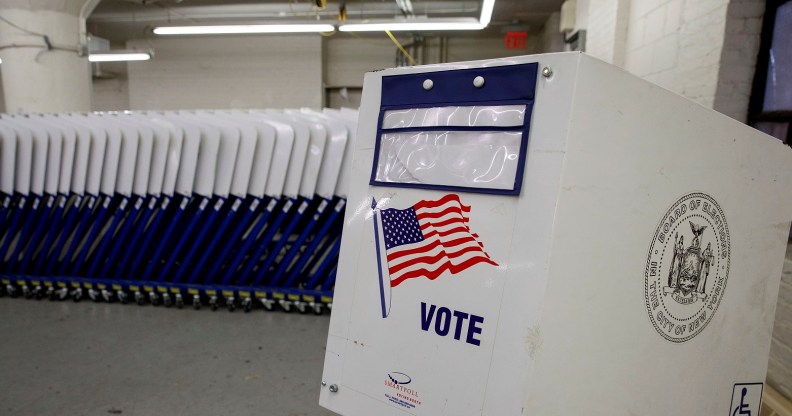US Election 2016: LGBTQ candidates to watch out for

Andrew Reynolds, director of the LGBT Representation and Rights Research Initiative at University of North Carolina at Chapel Hill, looks at the field of play for LGBTQ candidates in next week’s US elections.
There is overwhelming evidence to show that openly gay, lesbian, bisexual, transgender and queer people in elected office have a huge role to play in changing hearts and minds.
We know that a single voice in a legislature can dramatically alter the tone of debate and improve laws that effect the queer community.
When there is no voice in the room – as was the case in the North Carolina state legislature in March 2016 –homophobic and transphobic legislation like HB2 happens.
If you identify as LGBTQ, or are an ally, there is much to watch as the election returns come in next Tuesday night/Wednesday morning.
As the Presidential race consumes our attention, down ballot LGBTQ candidates will be battling to represent towns and cities across America.
The seven out incumbent congressmen and women all look likely to be re-elected.
The largest LGBTQ congressional caucus in history was eight when Mike Michaud (Maine) was also out in the House in 2013.
But next Tuesday the record could be broken with Angie Craig (MN2), Matt Heinz (AZ2) and Denise Juneau (MT1) all with decent shots of ousting incumbent Republicans.
Brady Walkinshaw (WA 7) and Jim Gray (KY Senate) could add to those record numbers but Walkinshaw faces an uphill battle against the equally progressive Democrat, Pramila Jayapal, who beat him by 17% in the primary and it remains a long shot for Gray to oust Rand Paul in Kentucky.
Two other candidates to watch are Democrat Jim Moeller in the Washington 3rd who hopes to benefit from the Trump down ballot effect in his race to oust the incumbent Republican, and Republican Paul Babeau (AZ1) who, if elected, would be the first out Republican elected to the House.
However, the US remains far behind the curve.
The cohort in the House of Representatives would have to hit ten before America would make it into the top-ten list of LGBTQ inclusive parliaments around the world. (For example, there are 39 out LGB MPs in the British House of Commons).
Kate Brown of Oregon should easily cement her position as the only out LGBTQ Governor but the real action will be in the state house races.
Over 100 out candidates are running but, despite all the recent legal and social progress on gay rights, the number of LGBTQ statehouse members looks set to decline for the third straight year.
Right now there are 111 incumbent out LGBTQ State House members. Nineteen are not running again for a variety of reasons and nineteen are not up for re-election this cycle.
Five are attempting to move up to the state Senate from the state House. There are 34 new candidates.
If all the incumbents win (68) and all of the members now running for the Senate win (5) and all those new candidates with a strong chance of winning, do win (15) – along with the 19 members not up for re-election – that is still only 107.
Most worryingly the number of states with zero LGBTQ voice in their state legislatures will go from ten to at least thirteen. Delaware, Hawaii, and South Dakota are losing their only LGBTQ members.
That is an extra 3 million Americans living in states without a single out LGBTQ voice in their state capital. Unsurprisingly there is a dramatic partisan divide in the states.
There are only five Republicans in our database compared to 140 Democratic incumbents or new candidates. Two of the Republican incumbents are running again, one is stepping down, one is not up for re-election.
The one new Republican candidate – in New Hampshire –is likely to be elected – keeping the GOP LGBTQ numbers frozen at four.
Transgender candidates remain incredibly rare.
Misty Snow and Misty Plowright will heroically lose their congressional races in Utah and Colorado but Rachael Booth does have a small chance of becoming the first ever out trans person to take statehouse office in the Grafton 15th House District of New Hampshire.
In 2014 a Republican won the seat by 500 votes but next Tuesday there is no incumbent and there is an outside chance Booth could make history.
There are currently only three transgender Americans in elected office in all of the nation (a school board member in Massachusetts, a Judge in California, and a local alderperson in Wisconsin).
Andrew Reynolds will be live tweeting LGBTQ results throughout election night @AndyReynoldsUNC

https://cookpolitical.com/house/charts/race-ratings. PVI: Partisan Voting Index


Data complied by the UNC LGBTQ Representation and Rights Research Initiative, Olivia Jackson-Jordan and Charles W. Gossett.
This article was originally published via the UNC LGBTQ Representation and Rights Research Initiative
How did this story make you feel?

